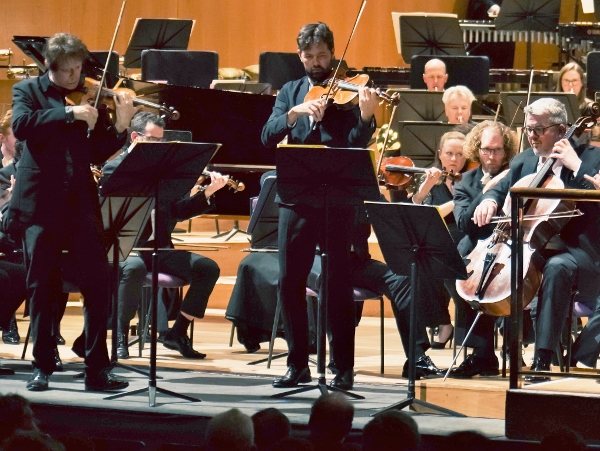For the second big concert of his “residency” with the Hallé this season, Thomas Adès chose one major piece of his own, rather than a set of shorter ones. Tevot, a 21-minute one-movement work written for the Berlin Philharmonic 18 years ago, requires a huge assembly of performers, so it was probably too good a chance to miss once having taken the decision to do Tippett’s Triple Concerto, which is pretty lavish in that regard, too.
Or was it the other way round? Whatever, the Bridgewater Hall’s stage extension was needed to get everyone on board – and while they were about it, Adès and the Hallé also gave the world premiere of Cartoon Sun, by Oliver Leith, a mesmeric piece that asks for several large bells to be chimed as part of its rich soundscape: they were up on high in the (unoccupied) choir seats behind the platform.
So it was an evening of sonic adventure and luxuriance, much appreciated by those present. By contrast, Adès included two pieces for strings only (or strings plus three wind players and a chorus of horns) which represented a dive into history.
The first of those was John Barbirolli’s Suite for Strings, Woodwind and Horns, drawn from Purcell’s music. It was originally made by Barbirolli for his own chamber orchestra in England, for strings only; then re-arranged for the New York Philharmonic in 1937, as a way of introducing Americans to some of British music’s heritage, and he brought it to Manchester with him in 1943. Given its era, it’s a restrained and faithful (compared with others’ efforts) updating of 17th century music for modern instruments: the salient points being its enjoyment of the sonorities the latter provide and its search for “Romantic” feeling – as would have been universally considered appropriate in the 1930s – in the original texts. Its six sections, which include the melodies of “Fairest Isle” and Dido’s Lament, were delivered by Thomas Adès and the players (led by Robert Ruisi) in a way that appreciated that historical setting and contained playing of great delicacy and expressiveness. Tippett’s Triple Concerto, though of a later era, dates from 1979, when musical aesthetics were not so very far removed from that – at least in the sweet melodiousness that inhabits the writing for its three soloists (violin, viola and cello), albeit combined with esoteric flutterings and vivacious energy in its episodic structure and kaleidoscopic effects (eight percussionists employed in addition to the timpanist). It is very demanding, too, and it’s to everyone’s credit that those three soloists (pictured above) were performers of the stature of Anthony Marwood, Lawrence Power and Paul Watkins – each a major exponent of his instrument – and that the music was played with such precision and emotional power under Adès’ care. The Michael Tippett Musical Foundation gave its support to this concert, and they had value for their money.
Tippett’s Triple Concerto, though of a later era, dates from 1979, when musical aesthetics were not so very far removed from that – at least in the sweet melodiousness that inhabits the writing for its three soloists (violin, viola and cello), albeit combined with esoteric flutterings and vivacious energy in its episodic structure and kaleidoscopic effects (eight percussionists employed in addition to the timpanist). It is very demanding, too, and it’s to everyone’s credit that those three soloists (pictured above) were performers of the stature of Anthony Marwood, Lawrence Power and Paul Watkins – each a major exponent of his instrument – and that the music was played with such precision and emotional power under Adès’ care. The Michael Tippett Musical Foundation gave its support to this concert, and they had value for their money.
The premiere of Oliver Leith’s Cartoon Sun, though, for me was the highspot of the whole evening. It’s another piece for large orchestra, enhanced in this case by the loan of some extra large bells from the Royal Liverpool Philharmonic Orchestra, which begin the music with alternating chimes on two pitches as violas hold a single note in crescendo, and then proceed to three and more, building a rich texture to a massive, plangent, chordal climax. Leith writes of “sounds so intensely full or loud that they feel that they may punch through ears and glass”, and he gets close to that: after a brief silence the tolling begins again in the strings, spreads to brass, woodwind and percussion and becomes a kind of ecstatic hymn with whooping trombones. It seems as if the chordal sequences and repetitions could carry us heavenward forever – but suddenly they fade and it’s all over. The piece is absorbing and thrilling: congratulations to the Hallé for commissioning it and to Adès for suggesting that they did so.
After the break, another gentle taste of history in string music, the five-minute miniature of Elgar’s Sospiri, which breathes the spirit of an age before the First World War destroyed so many dreams. The subtleties of its scoring were explored and the concentration of feeling in its sound put it almost on a par with Mahler.
Adès’ own Tevot brought in the biggest battalions of all: two timpanists, seven other percussionists (several of them having often to be on the move), eight horn parts, five trumpets, two tubas, five-member choruses of the single and both double reed families, and of the flutes. Not surprisingly, its results are resplendent in the mass and fascinating in detail, and its early strong underlying pulse leads to growing rhythmic variety and eventually a kind of jubilant war dance of a tutti. Decrease in dynamic only leads to increase in tension, more and more variety of sounds and delicate, glistening serenity before a vast final and clangorous ending. It’s good to have the creator in charge of his own creation for such an experience – and to know that Manchester’s orchestra can be capable, at least now and again, of managing such a spectacle.















Add comment